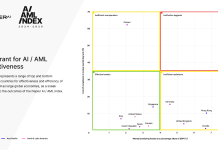There is no doubt FinTech is a booming industry. The sector, according to Statista, is expected to grow at an average rate of 12% to reach a value of €188bn by 2024. This makes transaction monitoring a hot-button issue going forward.
In a recent post, RegTech firm Sentinels examined ways to improve transaction monitoring for FinTechs to help them deal with this possible future roadblock.
Transaction monitoring includes the monitoring of customer transactions, and this can include purchases, transfers, deposits and withdrawals – and is commonly combined with an analysis of historical customer information to provide a complete picture of customer activity.
Sentinels remarked that transaction monitoring in FinTech is one of the many ways for these companies to manage risk and predict future customer activity, as well as enabling FinTechs to prevent money laundering, fraud, terrorist financing and other types of financial crime.
The company said, “In today’s connected world, transaction monitoring and analysis is crucial for meeting the requirements of many AML and counter-terrorist financing (CFT) laws, in addition to other compliance and reporting obligations.”
Sentinels added that while the most effective approach to transaction monitoring in FinTech would be tasking employees to manually stop and review and every single customer transaction, it lacks efficiency and is unworkable. Instead, many FinTechs will opt for an automated AML transaction monitoring tool that analyses transactions on an ongoing basis and flags potentially suspicious transactions for human review. Taking advantage of automation, the firm claims, enables FinTechs to eliminate human error and allocate more human capital to review and investigating potentially suspicious behaviour.
According to Sentinels, when implemented properly, a robust AML transaction monitoring tool will be able to detect a wide range of criminal activity including money laundering, terrorist financing, fraud, drug trafficking, identity theft, bribery and corruption.
Sentinels remarked, “Transaction monitoring in fintech is a vital weapon in the fight against financial crime. For FinTechs, it’s important because, as we mentioned, it’s a process that can help flag suspicious activities such as large cash deposits or wire transfers which could be linked to criminal activity.
“As the nature of financial crime continues to grow and regulations become more complex, transaction monitoring in fintech becomes more important. Automated transaction monitoring platforms and tools are going to play an increasingly critical role within FinTechs and other financial institutions.”
How can FinTechs improve their transaction monitoring? According to Sentinels, it is key to understand client risk factors, create rules for each risk, set up alerts, notify compliance teams and create a SAR.
Find the full post here.











